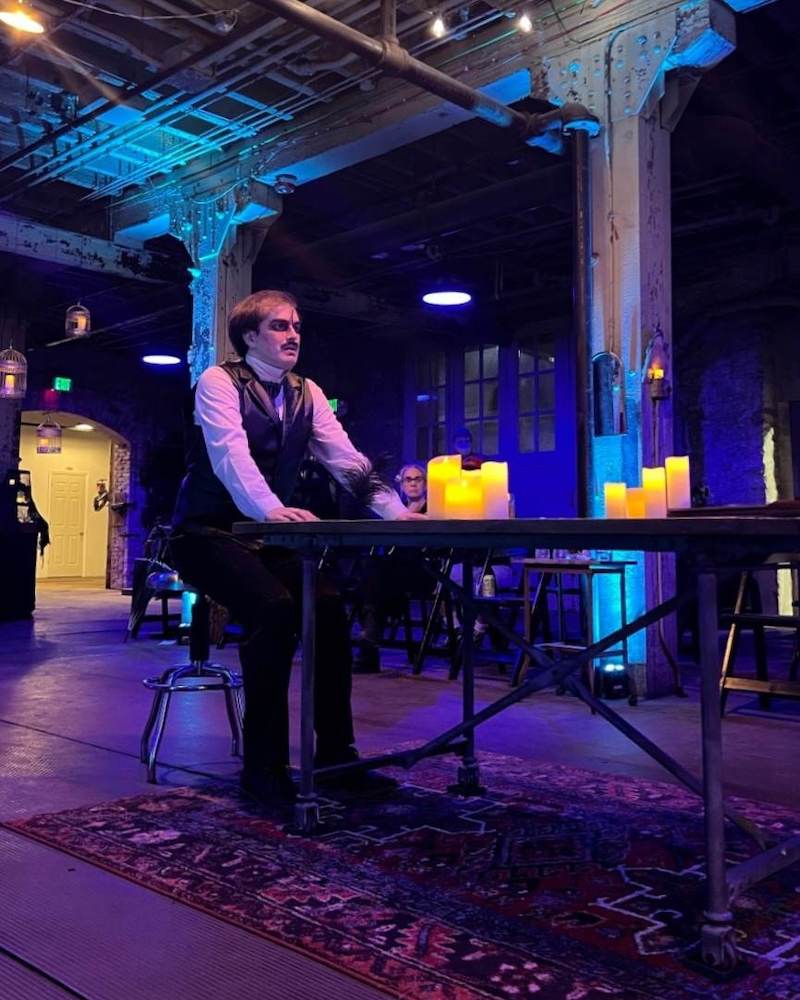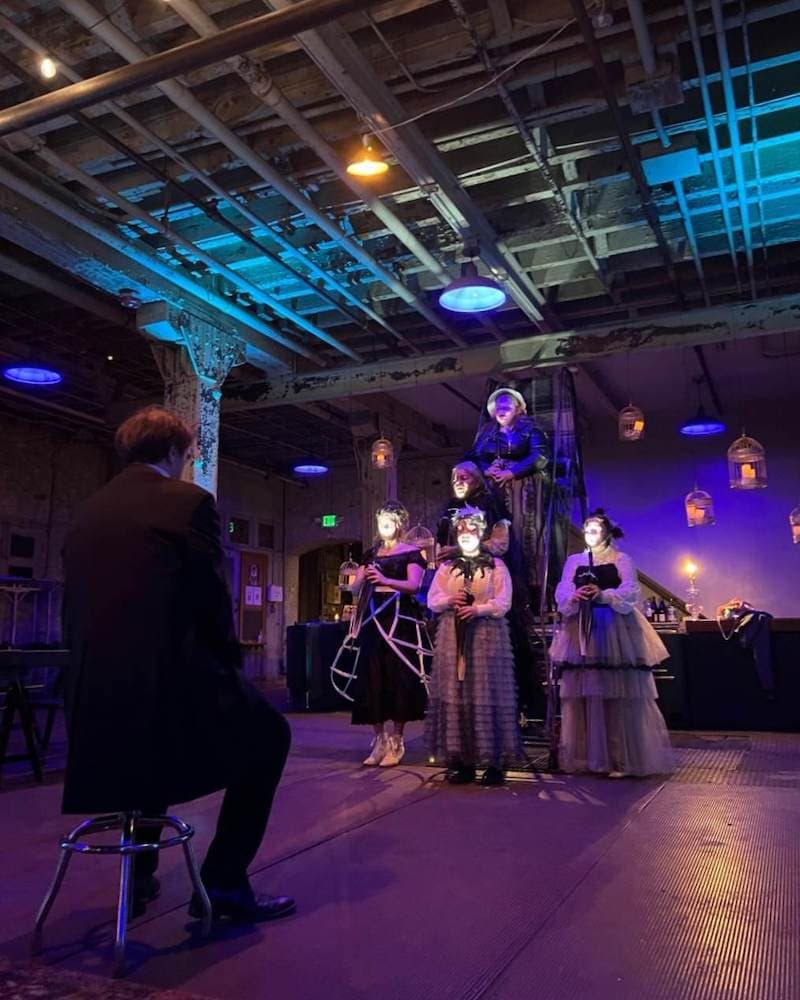It is easy to turn down a Baltimore corner to find historical markers denoting an event from Edgar Allan Poe’s life, career, love, and death — from the family home where he met his wife, to the last tavern he was seen alive in, to two graves (very fitting for a man so obsessed with death). And it’s even easier to find allusions to his name and literary works in everything ranging from Baltimore’s ice cream flavors and bumper stickers to the titles of many locally owned businesses throughout the city. Even the football team refers to Poe’s most famous poem: “The Raven.” When my best friend from grad school visited recently, she was delighted that Baltimore’s mascot was a literary figure. How many other cities can boast that?
Baltimore’s macabre son returns home in the musical Nevermore, its Baltimore premiere at Stillpointe Theatre, closing out the company’s 13th “Spooky” Season. First commissioned by Signature Theatre in Arlington, Nevermore had its world premiere on January 15, 2006. (It’s also been revived in the region more recently by Creative Cauldron in the 2018/19 season.)
In the playbill, composer Matt Conner shares that he visited many of the above Poe-centric sites, walking in the tortured footsteps of the poet and short story writer, trying to understand the method behind Poe’s madness. What Conner and librettist Grace Barnes uncover is a brilliant man haunted by spirits — the multiple decanters of whiskey he imbibes during the 90-minute musical but also the women of his life, from mothers to lovers to sex workers.

Directed by Stillpointe Theatre’s Ryan Haase, choreographed by Amanda Rife, with musical direction by Ben Shaver, Nevermore is a fantastical and fun study of the great American gothic writer with dedicated performances and a wonderfully ghastly design. It’s also a musical biopic very heavy-handed on the psychoanalytic treatment of its subject.
To paraphrase Freud: sometimes a raven is just a raven.
As Edgar, Bobby Libby throws himself into the role. We’ve all seen the photographs and caricatures of Poe with his melancholic, baggy eyes, expansive forehead, wisps of dark hair and mustache, and his impeccable suiting — a haunted man of the mind. (And this is a moment to note Danielle Robinette’s role doing makeup and hair to make Libby appear like this famously dour writer.) Libby also makes Poe a man of the flesh — drinking excessively, gambling, whoring, and psychologically abusive — whose crisp baritone sinks us to despair while his clear tenor always hints at the man Poe was unable to become: loved and happy.
Like Poe’s works, the musical is heavy on Freudian imagery and misogyny — the Oedipal complex, the madonna–whore dichotomy, beautiful maidens not long for this horrible world, men embalmed alive in dark holes and pits because of their desires. In Poe’s sinister and solipsistic worldview, all his troubles — his alcoholism, his despair, and his chaotic writing career — are the faults of the women in his life. The musical tries to tease out these threads, to interrogate Poe’s psyche and relationships, but it often ends up repeating Poe’s own beliefs.
For example, Poe’s ghostly mother, played like a fairytale stepmother by Kristen Zwobot, is cold and dismissive toward her son, but Poe’s mother died when he was only a toddler. He has never known this cruel woman before him, but she brutally tells him that he is searching for her in the eyes of every sex worker he pays for.
The other women in Poe’s life include Elmira — his first love, played as a buoyant belle by Christine Demuth; the bright soprano and youthful playfulness of Caitlin Weaver becomes Poe’s 13-year-old cousin/wife Virginia; Virginia’s apprehensive mother and a mother-proxy for Poe, Muddy, is powerfully performed by Kay-Megan Washington; and Rachel Blank, with her raspy alto, plays The Whore. As the play does not move in chronological order and all the women wear similar black and white costumes that nod toward the early Victorian era designed with a sense of Tim Burtonesque whimsy by Kitt Crescenzo — long tulle skirts, corseted waists, black parasols, and embellishments of raven feathers — we are to see how these different women become confused and conflated in Poe’s heart.

Yes, in Poe’s world, even the real-life flesh-and-blood women are not their own beings but are reduced to archetypes: virgin, lover, mother, whore, corpse/ghost. They exist to abandon or torment him, but also to inspire or impede his writing. Poe composes worshipful poems to his late mother and love letters to Elmira, he woos his child-bride Virginia by telling her scary bedtime stories such as “The Pit and the Pendulum” and “The Cask of Amontillado,” and his hired lover sings “Eldorado” to him.
Nevertheless, it is a gothically good time, especially when Poe’s own lyrical poems are set to music. The musical opens with Poe drinking and dying his ignominious death in a Baltimore ditch, while the specters of his women sing his poem “The Bells.” The prophetic poem that seems to foretell Virginia’s death from consumption, “Annabelle Lee,” and the macabre favorite “The Raven” are also performed in their entirety.
The simple set in Area 405, an old warehouse, lets the decay of industrial design — exposed pipes, corrugated metal flooring, steel beams — and the occasional flourishes added by Haase — blue lighting, a velvet sofa, a writing desk, candles suspended in birdcages, Persian rugs underfoot, and a sprinkling of raven’s feathers — add to the dreamlike atmosphere.
The music, orchestrated by Jonathan Tunik, is romantic and atmospheric as performed onstage by a suite of local musicians, rotating through different performances: Naomi Schneller Zajic (violin), Allen Hicks (viola), Billy Georg (keyboard/percussion), and Kara Welch (harp); Ben Shaver conducts and plays keyboard. (Laura Stokes, David Zajic, Stacey Antoine, and Jae Anthonee perform on some evenings.)
While Nevermore does not really shine a light on Poe’s tormented mind, it is an engaging ode to the melancholic and whimsical works of one of America’s great literary figures and the unofficial mascot of Baltimore.
Running Time: Approximately 90 minutes with no intermission.
Nevermore plays through May 6, 2023 (weekends only), presented by Stillpointe Theatre performing at Area 405 – 405 East Oliver Street, Baltimore, MD. For tickets ($25–$45), please visit here.
The program for Nevermore is online here.
Nevermore
Music by Matt Conner
Book by Grace Barnes
Source Material by Edgar Allan Poe
Video by Rachel Blank.




